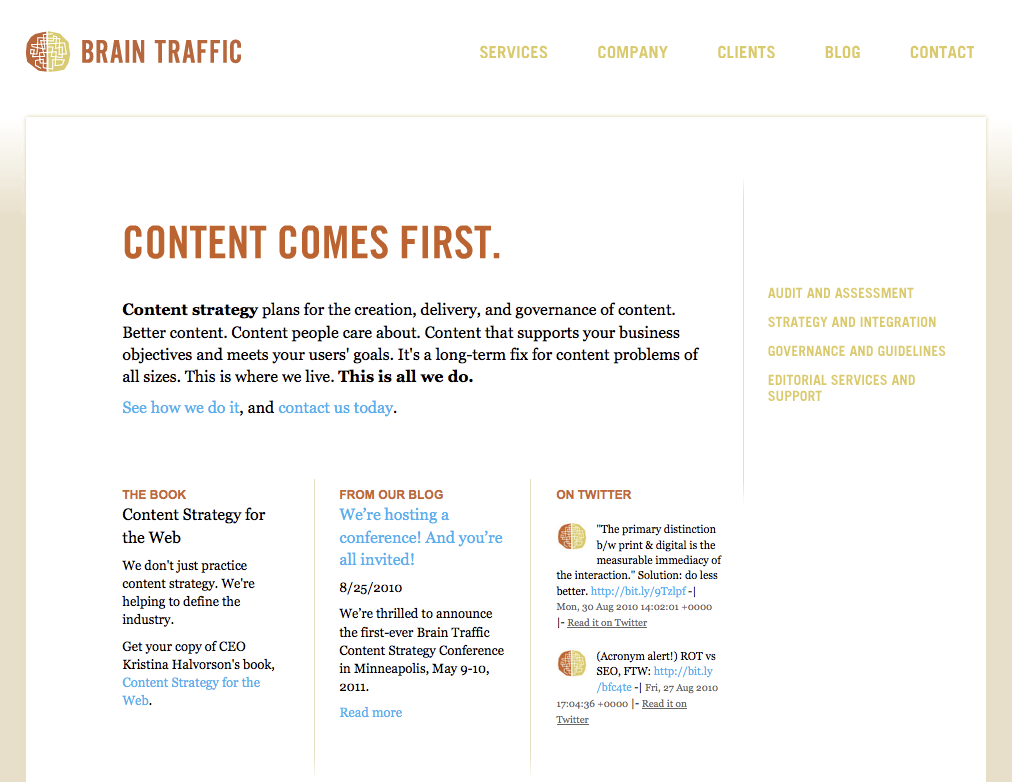In Chris Butler’s most recent newsletter, he brings up a lot of great points about the “readability” of websites and how the user interface of your site can affect if and for how long users will actually spend reading the content that is on the page before they get distracted and move on.
Chris also theorizes that people are still reading long-form stories and texts, they are just changing how and where they read them. However, despite our research, it is becoming a widely held belief that the attention span of the average person is shrinking. So I say, why bore them with tons of content? Why make them sift through a mass of text to find what they’re looking for? Why not deliver exactly what they want without all of the bells and whistles?
Our focus on SEO, rankings, keywords, and “the robots” has clouded our vision of what PEOPLE really want to read. The SEO experts will tell you that you have to create a lot of content if you want to move up in the rankings. This is true. But don’t just create content for the sake of creating content that only the robots are going to read. It may be hard to believe, but, more conversions come from human referrals than from search engine traffic, so think about who you really want to speak to. While search engines may bring more traffic to your site, people referring your site to other people will ultimately bring more conversions (form completions, sign-ups, etc.).
 I recently read a great blog post by Erin Anderson at Brain Traffic that used an analogy of a restaurant with a “limited offerings” menu. They only cook a few things, but they make them “goshdarned well.” That is the kind of content strategy we should all be shooting for. Not one that just bombards the user with content, but one that offers well-written, insightful content in a reasonable portion.
I recently read a great blog post by Erin Anderson at Brain Traffic that used an analogy of a restaurant with a “limited offerings” menu. They only cook a few things, but they make them “goshdarned well.” That is the kind of content strategy we should all be shooting for. Not one that just bombards the user with content, but one that offers well-written, insightful content in a reasonable portion.
Brain Traffic does a great job of taking their own advice. They are a content strategy company, so they should know best. They post brief, yet relevant blogs and spaced intervals, giving their users time to read and learn from them without bombarding them with too much content. I think anyone can use their strategy as an example, and while you’re at it, READ some of their great content about content!
People are still interested in reading, but they aren’t going to put up with long, repetitive articles that are just trying to get the attention of the google bots. If you are creating relevant and engaging content, then people will find it and read it. Sure, you may not be getting as MUCH traffic to your site this way, but you will be getting BETTER traffic.
I’m not saying to stop creating content altogether. In fact, I am in favor of a content strategy that produces content on a regular basis. The content should, however, be presented in a way that is readable with fewer distractions so that people can focus on what you are saying AND it should be interesting to your target audience with a strong focal point (other than your own SEO).
So write something that people can easily digest and is useful to them, and they will thank you for it. It will be a better, healthier content strategy which in the long run will bring you better, more targeted traffic.